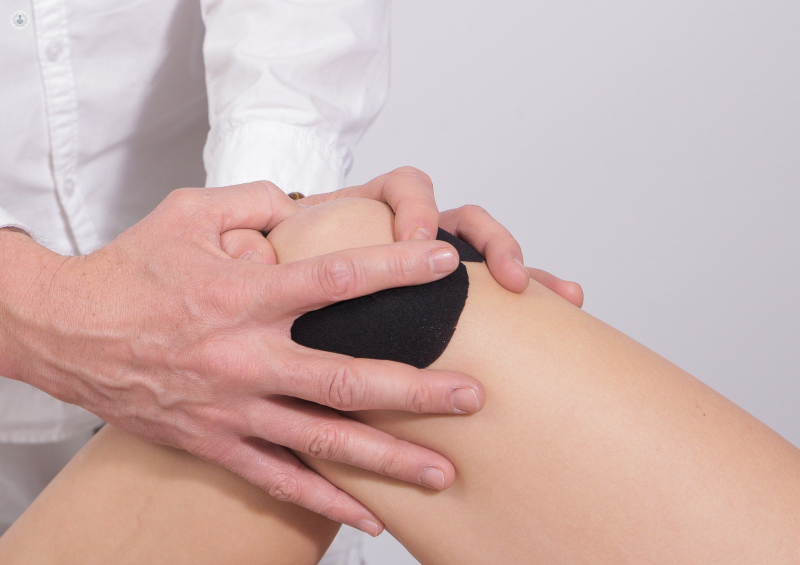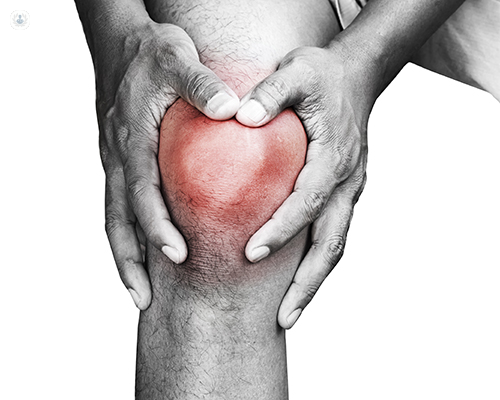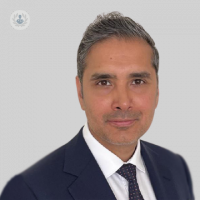Joint soft tissue pain: a comprehensive, expert overview
Written by:Joint soft tissue pain can severely affect any part of the human body that has experienced injury, or that has been overexerted.
In our latest article, highly revered and experienced consultant sport and medicine physician, Dr Shabaaz Mughal offers a comprehensive overview of joint soft tissue pain, including the main symptoms and most effective treatment options available.

What is joint soft tissue pain?
Joint soft tissue pain is pain that essentially affects any of the structures around the joint, but not actually the bone or cartilage of the joint itself. When we talk about soft tissues, we are referring to the ligaments and tendons, the joint capsule, the retinaculum, the sheaths surrounding the tendons, and sometimes, even the muscles as well.
What are the main symptoms of joint soft tissue pain?
The main symptoms of joint soft tissue pain that patients generally present with, after injury, trauma or overuse, include:
- pain
- swelling
- redness
- warmth
- restriction in the movement
- instability of the joint
What are the main conditions associated with joint soft tissue pain?
The main associated conditions typically include:
- ligament tear – ranging from a few fibres to a complete disruption
- tendon damage (acute or chronic damage)
- damaged and/or torn tendon sheaths
- retinaculum tear, which can lead to tendon subluxation
- joint capsule tear
- twisted/sprained joint - which may be the precipitating injury to the soft tissues
What are the differences between arthritis and these joint soft tissue pain associated conditions mentioned above?
Arthritis affects the joint itself and the integrity of the joint. When we talk about arthritis, we are mainly referring to bone and cartilage, and in arthritis, patients suffer from damaged cartilage and damaged bones.
Essentially, when it comes to arthritis, patients experience a change in the chemical composition of the joint itself, which can lead to pain, swelling, restriction in the movement of the joint, but is actually coming from the joint itself. Joint soft tissue injuries and pain, on the other hand, come from structures surrounding the joint.

Can joint soft tissue pain be chronic? If so, how can it be treated?
It can most definitely be chronic, especially if it is not being managed appropriately from the outset, meaning that when a patient has acutely suffered the injury, if it is not being optimally managed, it can certainly go on and become chronic.
It can also be of a chronic nature if it is an overuse injury that has gradually come on over time.
How can non-chronic and chronic joint soft tissue pain be treated?
In this situation, we must ask ourselves how we can stop it from becoming chronic. In order to achieve this, the management has got to be spot on, and the PRICE (Protect, Rest, Ice, Compress, Elevation) concept should be initiated and followed by the patient.
By doing these things, we can then proceed to the next stages of preventing chronic joint soft tissue pain, which is optimal load management and rehabilitation as well as appropriate mobilisation.
If the condition has become chronic, we can also use anti-inflammatory medication and various types of injections. Of course, it heavily depends on what the exact diagnosis is, but this is how we would typically help when it comes to more chronic cases of joint soft tissue pain.
Future and current treatment options for joint soft tissue pain and injury
A treatment modality we are currently using and doing further research into, is the use of various orthobiologics. One of the main ones right now is PRP (Platelet Rich Plasma), where we basically take a sample of your blood, and it’s put in a centrifuge. This separates the whole blood into its different component cells.
The cells that we are looking to utilise are the platelets (which are the healing cells of the body). We can significantly help promote the healing by directly injecting this PRP therapy injection into a joint soft tissue injury.
This is a very natural method because you are not introducing anything external into the body, but you are basically using the body’s own healing properties and giving the body a helping hand or pointing it in the right direction towards full recovery.
Physiotherapy, then, of course, is another treatment option and is a huge part of the rehabilitation process. This involves getting the movement, strength and stability back and getting you back to full function, and hopefully restoring not only the function you had before but also improving that function, so you can return to the same level or an even better level.
There are also some cases where surgery will be required, followed by a period of rehabilitation, but again, it really does depend on the diagnosis and overall severity and stage of the injury.
If you have any concerns relating to pain in your joints, muscles or tendons, the exceptionally regarded Dr Mughal can certainly help you, either by providing peace of mind, or by diagnosing and offering appropriate and effective treatment for your pain and/or injury. You can book an appointment with Dr Mughal by visiting his Top Doctors profile here.


